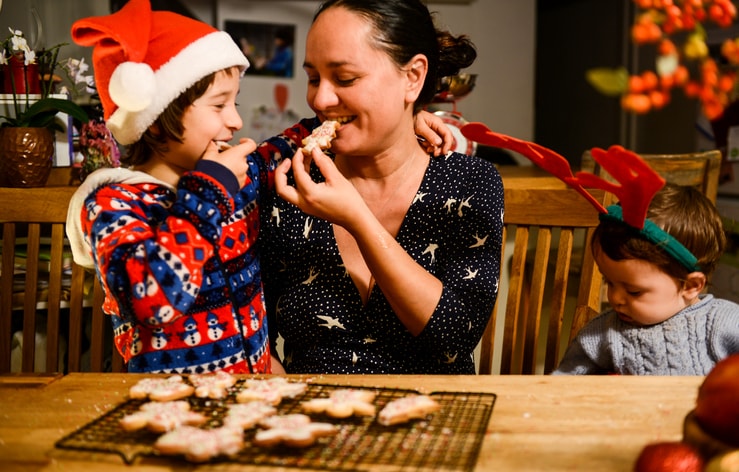The holiday season is known for twinkling lights, chilly weather and pretty songs, but in the U.S. we’ve created another, more problematic holiday tradition: talking about dieting. As the holiday cookies, candy and feasts come out, so do unnecessary comments about calories and pounds that will need to be shed starting on January 1.
This kind of holiday diet talk is boring and toxic among adults, but what’s even more disturbing is when adults make these kinds of comments in front of kids.
Recently, my 11-year-old daughter experienced this firsthand. On a field trip, an instructor started chatting with kids about their holiday plans. The instructor mentioned something about already feeling “chubby” from all the Halloween candy, and then remarked that this year she’d need to “skip the mashed potatoes and cookies” during Thanksgiving and Christmas.
To another 30-something, this kind of comment might be dismissed as small talk, but it left my daughter questioning if there was something “bad” about indulging in her favorite holiday foods and why a grown-up might talk about their body that way. The fact that another adult was so casual in talking about her weight and food restrictions in front of a bunch of impressionable fifth graders left me with a few questions as well.
The problem with holiday diet talk
It’s no secret that our culture is obsessed with dieting and weight loss. The weight loss industry has raked in $3.8 billion in 2022 alone, and our social media feeds are constantly littered with advertisements about different diet plans, weight loss apps and exercise gadgets that promise to help us shed unwanted pounds.
For adults, it can be difficult to get through a single day without someone mentioning how they need to lose weight or eliminate an entire food group. It’s seen as normal for adults to talk about their body dissatisfaction, weight and eating habits around the holidays. My own parents tell me they’re skipping meals in order to “save room” for the big feasts ahead, and my Peloton app encourages me to participate in “turkey burn” classes to use up the extra calories. These messages seem acceptable and even harmless to many people.
And it’s perhaps due to the rampant normalization of diet talk that we forget just how much real harm these comments can inflict. The cost of this kind of talk is reinforcing attitudes about bodies and eating habits that lead to stigma and real mental and emotional turmoil for many people, especially young kids.
Kids ages 5-8 are more likely to be dissatisfied with their bodies if they think their moms are unhappy with their own body size.
COMMON SENSE MEDIA
Kids aren’t tiny adults who can easily dismiss our tired jokes about “burning off the turkey” or asking Santa for a treadmill. They’re impressionable, and they’re learning how to feel about their own bodies and their peer’s bodies by listening to us. When we talk about weight and our bodies in a negative way, we unconsciously reinforce the myth that thinness is equivalent to worthiness and that existing in a larger body is inherently unhealthy, undesirable and wrong. This is called weight stigma, and it’s associated with a host of negative effects, including:
- Low self-esteem.
- Negative body image.
- Depression.
- Anxiety.
- Rejection by peers and family members.
- Eating disorders.
Kids are impacted by weight stigma from a young age. One study by the American Academy of Pediatrics (AAP) found that kids as young as 9 years old already exhibit implicit bias against peers they perceive as being overweight. Being overweight or obese is also one of the most common reasons that children and adolescents are teased or bullied at school.
Diet talk doesn’t only encourage kids to be mean or judgmental towards their peers. There’s also the very real risk that they will turn that cruel, critical lens on themselves. More than half of girls and one-third of boys ages 6-8 years old feel they should be thinner, according to a report by Common Sense Media. Even kids as young as 5 years old already express some body dissatisfaction, and kids ages 5-8 are more likely to be dissatisfied with their bodies if they think their moms are unhappy with their own body size.
In 2021, the AAP issued new guidance on treating and diagnosing eating disorders, citing data that shows the median age for the onset of eating disorders is 12.5 years old and that adolescent girls and boys are both at risk. In their guidance, one thing they stress is that parents and pediatricians alike should not talk about weight with kids.
When we talk about our bodies, kids are listening
A comment about skipping mashed potatoes might seem innocent, but it matters what we say about food and our bodies when kids are listening. When my daughter told me about what her instructor said, I thought back to my own childhood, back to the young version of me who would look in the mirror and pinch the soft parts of her stomach after hearing her mother and grandmother talk about eating nothing but scrambled egg whites to lose weight after Christmas.
I thought about the other kids in her class overhearing an adult they admire talking about restricting food and wondering—perhaps for the first time—if their own bodies are also too big and if they should skip their favorite holiday treats or even stop eating altogether in order to shrink.
We should know better than to treat once-a-year celebrations as if they are the sole determinant of our health.
As adults, we should know better than to treat once-a-year celebrations as if they are the sole determinant of our health and body size (which aren’t necessarily correlated, by the way). But, even more than that, we should know better than to saddle the young kids around us with damaging ideas about their own body size and their relationship with food that may continue to impact them long after the decorations have been boxed up and put away.
The holiday season is special, and it only comes once a year. This year, let’s shut down the constant chatter about calorie counts and our grown-up tales of sugar cookie regret and give children the gift of being able to enjoy it.





